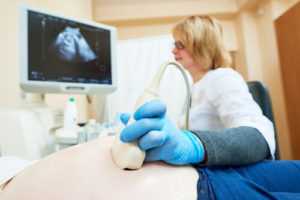Premature Rupture of Membranes

One of the conditions that can occur during pregnancy that can jeopardize the health of the child is the premature rupture of membranes. An untimely rupture of this membrane can lead to serious infection, lack of oxygen, and premature delivery, all of which can impede the baby’s proper development.
If medical professionals failed to recognize the symptoms of a prematurely ruptured membrane, we can build a birth injury case on your behalf. Please call Stern Law, PLLC at (800) 462-5772 for your free consultation.
What is premature rupture of membranes?
A pregnant woman often will experience the rupture of her amniotic sac, or her water breaking, during the first stage of labor. This is a normal part of the progression of a pregnancy. However, there is a condition known as premature rupture of membranes (PROM) when the amniotic sac around the unborn baby ruptures before the mother is in labor. If the rupture occurs before the 37th week of the pregnancy, then it is known as preterm premature rupture of membranes (PPROM) and can lead to serious jeopardy for the baby if not treated promptly and correctly.
PROM and PPROM do occur in approximately fifteen percent (15%) of pregnancies, although for many women the rupture is so close to the end of the pregnancy term that it does not have a significant impact on the delivery of the baby. The more serious PPROM affects approximately three percent (3%) of pregnant women and is responsible for between 25-30% of premature deliveries.
Risk factors for preterm membrane rupture
- Smoking during pregnancy
- Previous membrane rupture
- Vaginal bleeding during the pregnancy
- Uterine infection
- Overly distended amniotic sac resulting from too much amniotic fluid or multiple fetuses
- Trauma to the uterus
- Untreated sexually transmitted diseases
Symptoms and complications of premature membrane rupture
A rupture will present through fluid flowing or leaking from the vagina. A doctor can examine the cervix to determine if fluid is leaking from the cervical opening and test the pH of the fluid. An ultrasound can be used to create an image of the baby’s internal organs and the volume of fluids surrounding the baby.
Although the amount of fluid often will be significant, there are times when it will be a slow seepage of liquid that may be confused with urine. Amniotic fluid has a slightly sweet odor to it, which is how it can be distinguished from the ammonia smell of urine.
PPROM can lead to:
- Infections in both the mother and child
- Increased chance of a prolapsed umbilical cord
- Preterm labor and delivery, leading to an underdeveloped baby
A preterm rupture may necessitate an emergency Cesarean section.
Treatment of premature rupture
If a woman experiences PROM at 37 weeks or later, her doctor will induce labor within 24 hours of the rupture if it does not begin naturally. If the rupture occurs before the 37th week and a safe delivery of the baby is not possible, then the mother usually is placed on bed rest in a hospital, given antibiotics to prevent maternal and fetal infection, and administered corticosteroids to promote the development of the baby’s lungs in order to be ready for an early delivery.
In rare instances, a tear or rupture at the top of the amniotic sac will seal itself. Often, a rupture during the second trimester will lead to a failed pregnancy.
Although medical care often can aid in the delivery of a healthy baby, even after the mother has experienced a membrane rupture, there are times when the medical professionals responsible for the care and welfare of your child fail in their duties and the result is a birth injury from which your child will suffer for the remainder of his or her life.
Medical malpractice and premature rupture of membranes
The medical problems in a child born too soon due to preterm premature rupture of membranes (PPROM) can be extensive if the doctors and other medical professionals treating the mother failed in their duties. The malpractice could have been the result of the following:
- Failure to diagnose an infection or sexually transmitted disease that led to the PPROM
- Failure to diagnose the PPROM and render proper medical care
- Failure to administer antibiotics to treat maternal and/or fetal infection
- Failure to administer corticosteroids to accelerate development of the baby’s lungs in preparation for an early delivery
- Failure to diagnose fetal distress caused by a prolapsed umbilical cord
- Failure to order a Cesarean section in a timely manner
- Failure to properly treat a newborn in distress
In most instances, the doctors and other medical professionals will do everything in their power to preserve the health of your child. When they fail to do so and your child suffers a severe birth injury, they must be held fully accountable so that your child can get the help and benefits to which he or she is entitled.
For a free review of your case, please call (800) 462-5772 to speak with an attorney at Stern Law, PLLC. Our firm has over 30 years of experience assisting families with birth injury cases in the wake of medical malpractice.







